Digital Technology's Influence on Sainsbury's Business Operations
VerifiedAdded on 2020/12/24
|9
|2138
|402
Report
AI Summary
This report investigates the impact of digital technologies on transforming the business operations of Sainsbury in the United Kingdom. It begins with an introduction highlighting the significance of digital technologies in gaining competitive advantages. The report includes a comprehensive literature review, comparing and contrasting various authors' perspectives on digital technologies and their influence. It then outlines the research methodology, including research philosophy, approach, design, strategy, data collection methods (questionnaires), and sampling techniques. A project management plan, encompassing scope, timeline (26 weeks), risks, and budget (£1000), is also presented, along with a detailed Gantt chart illustrating project timelines. The report aims to assess the meaning of digital technologies, examine their influence on Sainsbury's operations, and identify the challenges faced after implementation. Key topics covered include the meaning of digital technologies, their influence on business operations, and the challenges faced by organizations. The research uses an exploratory design with a quantitative research strategy, employing thematic analysis for data interpretation. The report concludes with a discussion of the findings and recommendations for Sainsbury, providing a valuable analysis of digital technology's role in business transformation.
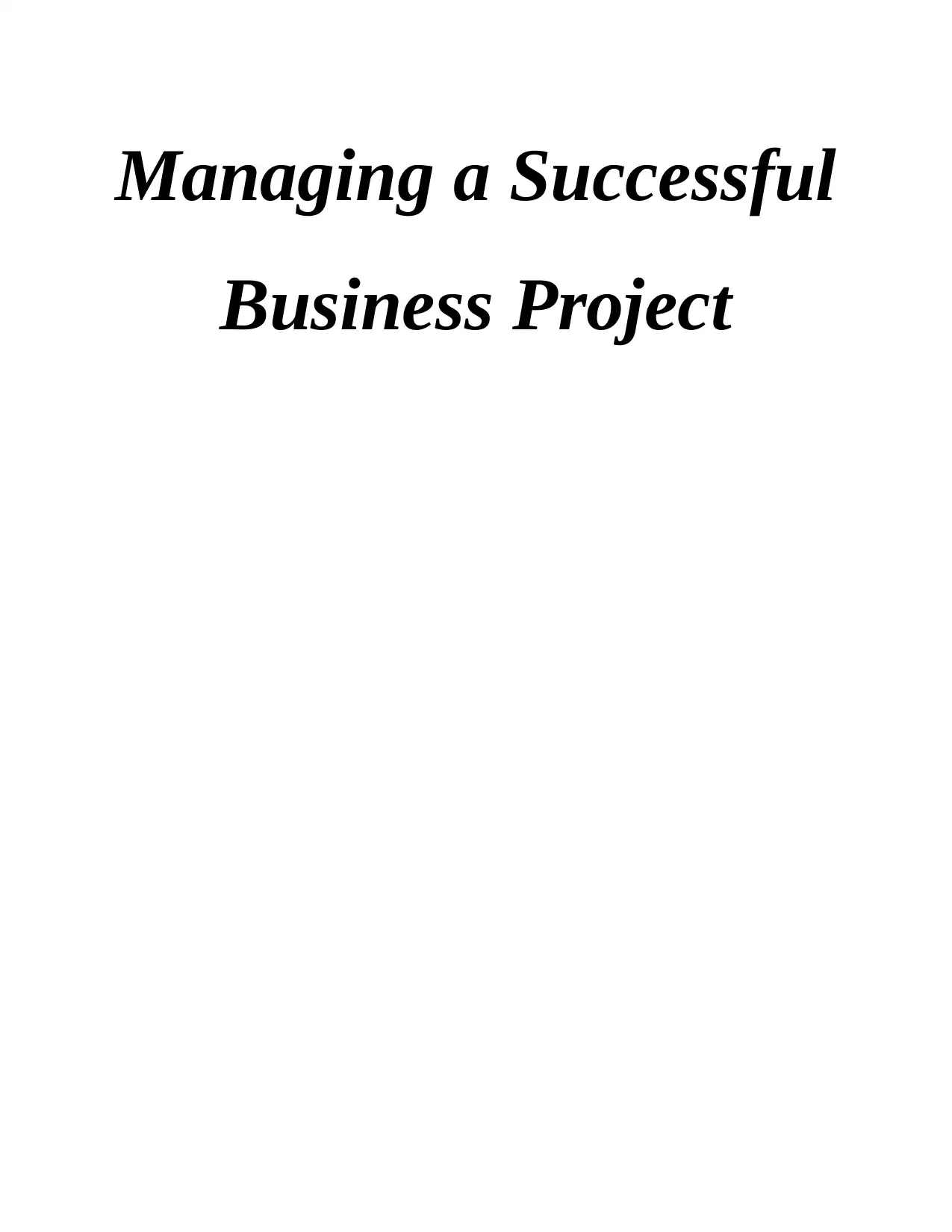
Managing a Successful
Business Project
Business Project
Paraphrase This Document
Need a fresh take? Get an instant paraphrase of this document with our AI Paraphraser
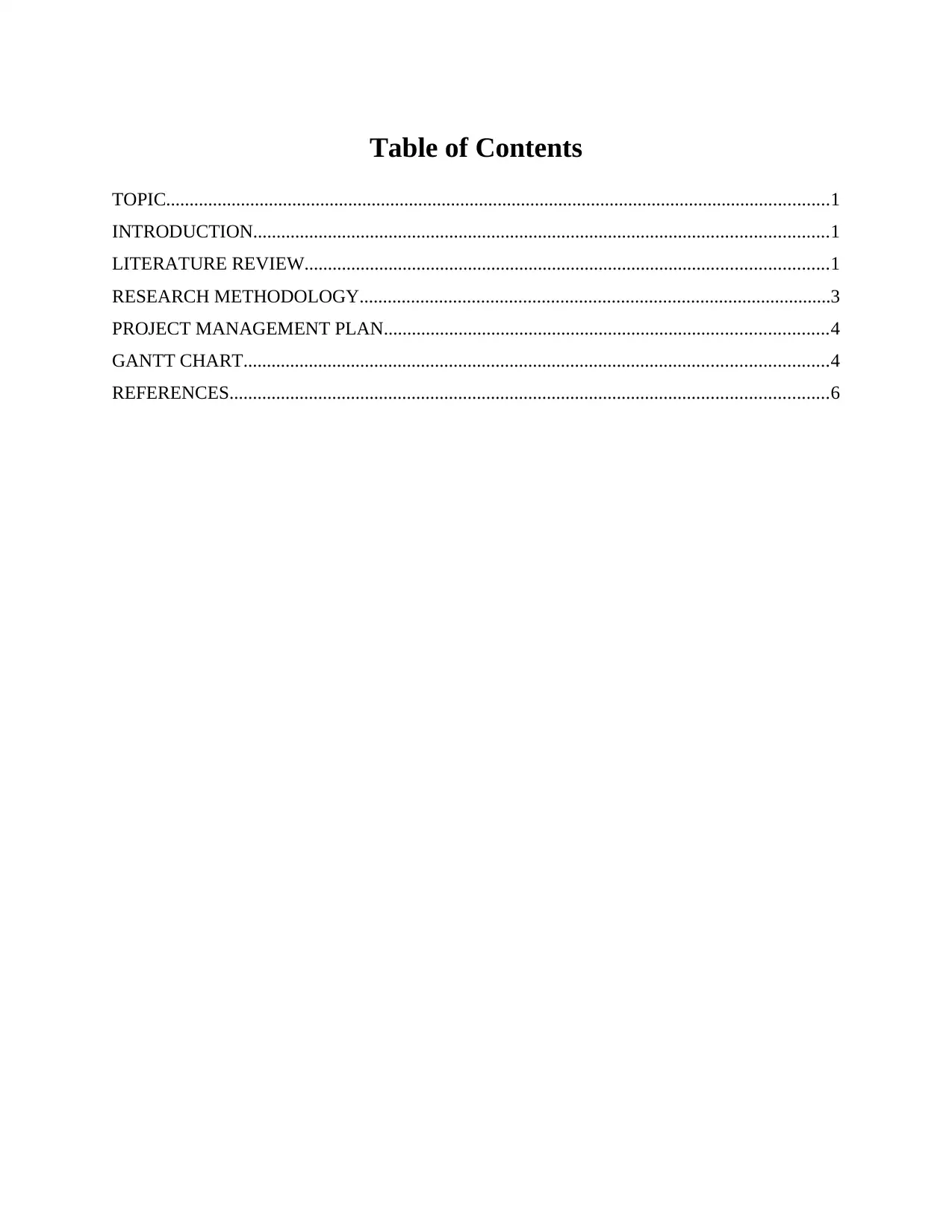
Table of Contents
TOPIC..............................................................................................................................................1
INTRODUCTION...........................................................................................................................1
LITERATURE REVIEW................................................................................................................1
RESEARCH METHODOLOGY.....................................................................................................3
PROJECT MANAGEMENT PLAN...............................................................................................4
GANTT CHART.............................................................................................................................4
REFERENCES................................................................................................................................6
TOPIC..............................................................................................................................................1
INTRODUCTION...........................................................................................................................1
LITERATURE REVIEW................................................................................................................1
RESEARCH METHODOLOGY.....................................................................................................3
PROJECT MANAGEMENT PLAN...............................................................................................4
GANTT CHART.............................................................................................................................4
REFERENCES................................................................................................................................6
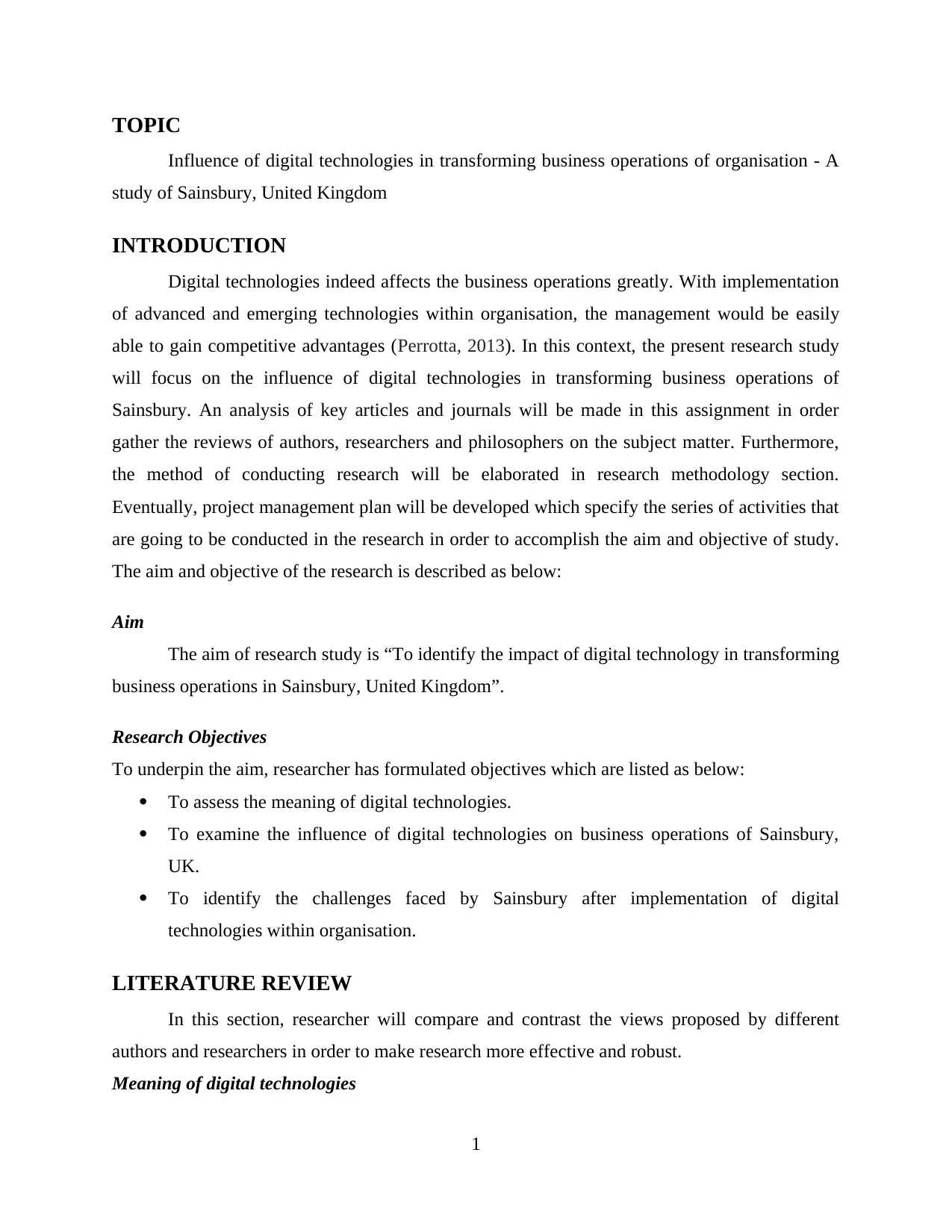
TOPIC
Influence of digital technologies in transforming business operations of organisation - A
study of Sainsbury, United Kingdom
INTRODUCTION
Digital technologies indeed affects the business operations greatly. With implementation
of advanced and emerging technologies within organisation, the management would be easily
able to gain competitive advantages (Perrotta, 2013). In this context, the present research study
will focus on the influence of digital technologies in transforming business operations of
Sainsbury. An analysis of key articles and journals will be made in this assignment in order
gather the reviews of authors, researchers and philosophers on the subject matter. Furthermore,
the method of conducting research will be elaborated in research methodology section.
Eventually, project management plan will be developed which specify the series of activities that
are going to be conducted in the research in order to accomplish the aim and objective of study.
The aim and objective of the research is described as below:
Aim
The aim of research study is “To identify the impact of digital technology in transforming
business operations in Sainsbury, United Kingdom”.
Research Objectives
To underpin the aim, researcher has formulated objectives which are listed as below:
To assess the meaning of digital technologies.
To examine the influence of digital technologies on business operations of Sainsbury,
UK.
To identify the challenges faced by Sainsbury after implementation of digital
technologies within organisation.
LITERATURE REVIEW
In this section, researcher will compare and contrast the views proposed by different
authors and researchers in order to make research more effective and robust.
Meaning of digital technologies
1
Influence of digital technologies in transforming business operations of organisation - A
study of Sainsbury, United Kingdom
INTRODUCTION
Digital technologies indeed affects the business operations greatly. With implementation
of advanced and emerging technologies within organisation, the management would be easily
able to gain competitive advantages (Perrotta, 2013). In this context, the present research study
will focus on the influence of digital technologies in transforming business operations of
Sainsbury. An analysis of key articles and journals will be made in this assignment in order
gather the reviews of authors, researchers and philosophers on the subject matter. Furthermore,
the method of conducting research will be elaborated in research methodology section.
Eventually, project management plan will be developed which specify the series of activities that
are going to be conducted in the research in order to accomplish the aim and objective of study.
The aim and objective of the research is described as below:
Aim
The aim of research study is “To identify the impact of digital technology in transforming
business operations in Sainsbury, United Kingdom”.
Research Objectives
To underpin the aim, researcher has formulated objectives which are listed as below:
To assess the meaning of digital technologies.
To examine the influence of digital technologies on business operations of Sainsbury,
UK.
To identify the challenges faced by Sainsbury after implementation of digital
technologies within organisation.
LITERATURE REVIEW
In this section, researcher will compare and contrast the views proposed by different
authors and researchers in order to make research more effective and robust.
Meaning of digital technologies
1
⊘ This is a preview!⊘
Do you want full access?
Subscribe today to unlock all pages.

Trusted by 1+ million students worldwide
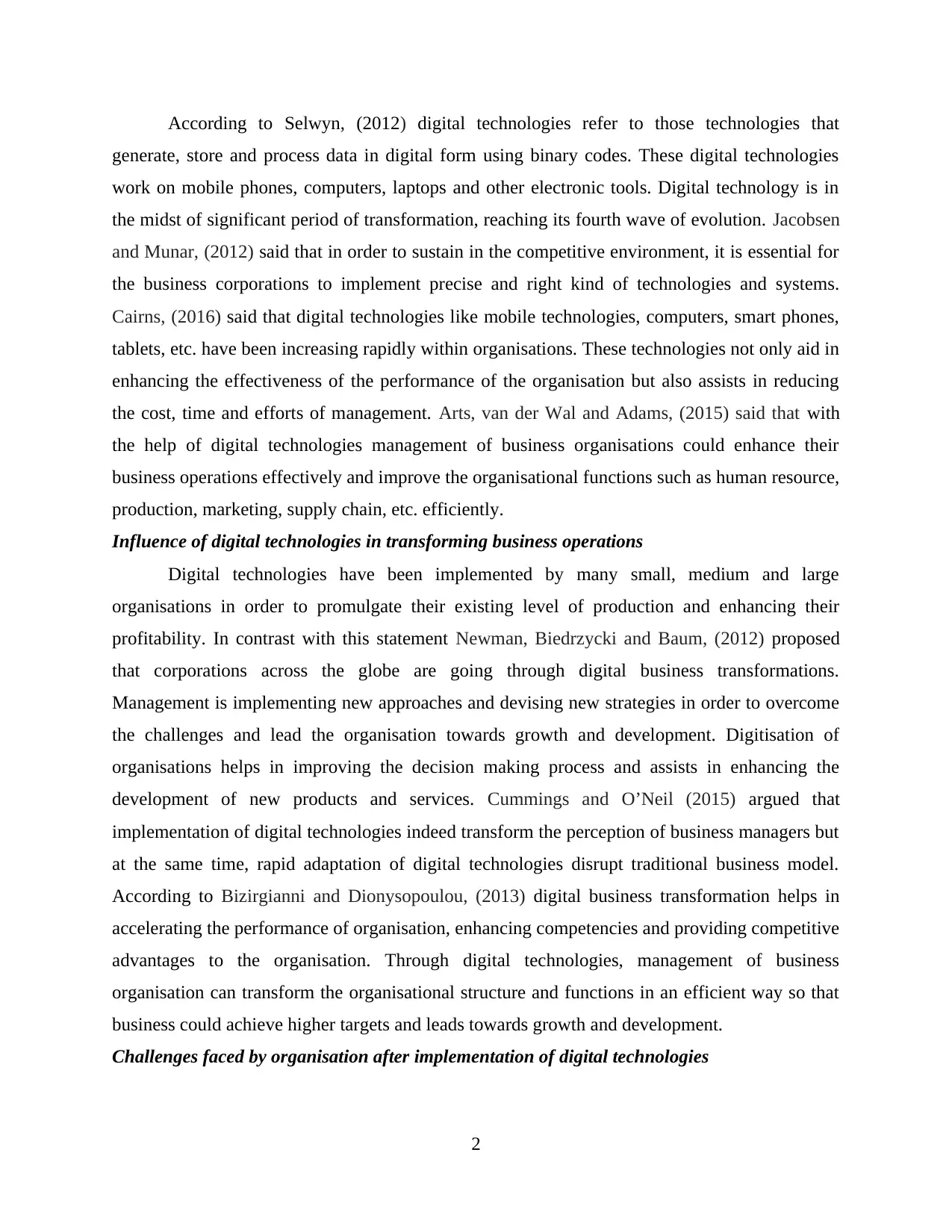
According to Selwyn, (2012) digital technologies refer to those technologies that
generate, store and process data in digital form using binary codes. These digital technologies
work on mobile phones, computers, laptops and other electronic tools. Digital technology is in
the midst of significant period of transformation, reaching its fourth wave of evolution. Jacobsen
and Munar, (2012) said that in order to sustain in the competitive environment, it is essential for
the business corporations to implement precise and right kind of technologies and systems.
Cairns, (2016) said that digital technologies like mobile technologies, computers, smart phones,
tablets, etc. have been increasing rapidly within organisations. These technologies not only aid in
enhancing the effectiveness of the performance of the organisation but also assists in reducing
the cost, time and efforts of management. Arts, van der Wal and Adams, (2015) said that with
the help of digital technologies management of business organisations could enhance their
business operations effectively and improve the organisational functions such as human resource,
production, marketing, supply chain, etc. efficiently.
Influence of digital technologies in transforming business operations
Digital technologies have been implemented by many small, medium and large
organisations in order to promulgate their existing level of production and enhancing their
profitability. In contrast with this statement Newman, Biedrzycki and Baum, (2012) proposed
that corporations across the globe are going through digital business transformations.
Management is implementing new approaches and devising new strategies in order to overcome
the challenges and lead the organisation towards growth and development. Digitisation of
organisations helps in improving the decision making process and assists in enhancing the
development of new products and services. Cummings and O’Neil (2015) argued that
implementation of digital technologies indeed transform the perception of business managers but
at the same time, rapid adaptation of digital technologies disrupt traditional business model.
According to Bizirgianni and Dionysopoulou, (2013) digital business transformation helps in
accelerating the performance of organisation, enhancing competencies and providing competitive
advantages to the organisation. Through digital technologies, management of business
organisation can transform the organisational structure and functions in an efficient way so that
business could achieve higher targets and leads towards growth and development.
Challenges faced by organisation after implementation of digital technologies
2
generate, store and process data in digital form using binary codes. These digital technologies
work on mobile phones, computers, laptops and other electronic tools. Digital technology is in
the midst of significant period of transformation, reaching its fourth wave of evolution. Jacobsen
and Munar, (2012) said that in order to sustain in the competitive environment, it is essential for
the business corporations to implement precise and right kind of technologies and systems.
Cairns, (2016) said that digital technologies like mobile technologies, computers, smart phones,
tablets, etc. have been increasing rapidly within organisations. These technologies not only aid in
enhancing the effectiveness of the performance of the organisation but also assists in reducing
the cost, time and efforts of management. Arts, van der Wal and Adams, (2015) said that with
the help of digital technologies management of business organisations could enhance their
business operations effectively and improve the organisational functions such as human resource,
production, marketing, supply chain, etc. efficiently.
Influence of digital technologies in transforming business operations
Digital technologies have been implemented by many small, medium and large
organisations in order to promulgate their existing level of production and enhancing their
profitability. In contrast with this statement Newman, Biedrzycki and Baum, (2012) proposed
that corporations across the globe are going through digital business transformations.
Management is implementing new approaches and devising new strategies in order to overcome
the challenges and lead the organisation towards growth and development. Digitisation of
organisations helps in improving the decision making process and assists in enhancing the
development of new products and services. Cummings and O’Neil (2015) argued that
implementation of digital technologies indeed transform the perception of business managers but
at the same time, rapid adaptation of digital technologies disrupt traditional business model.
According to Bizirgianni and Dionysopoulou, (2013) digital business transformation helps in
accelerating the performance of organisation, enhancing competencies and providing competitive
advantages to the organisation. Through digital technologies, management of business
organisation can transform the organisational structure and functions in an efficient way so that
business could achieve higher targets and leads towards growth and development.
Challenges faced by organisation after implementation of digital technologies
2
Paraphrase This Document
Need a fresh take? Get an instant paraphrase of this document with our AI Paraphraser
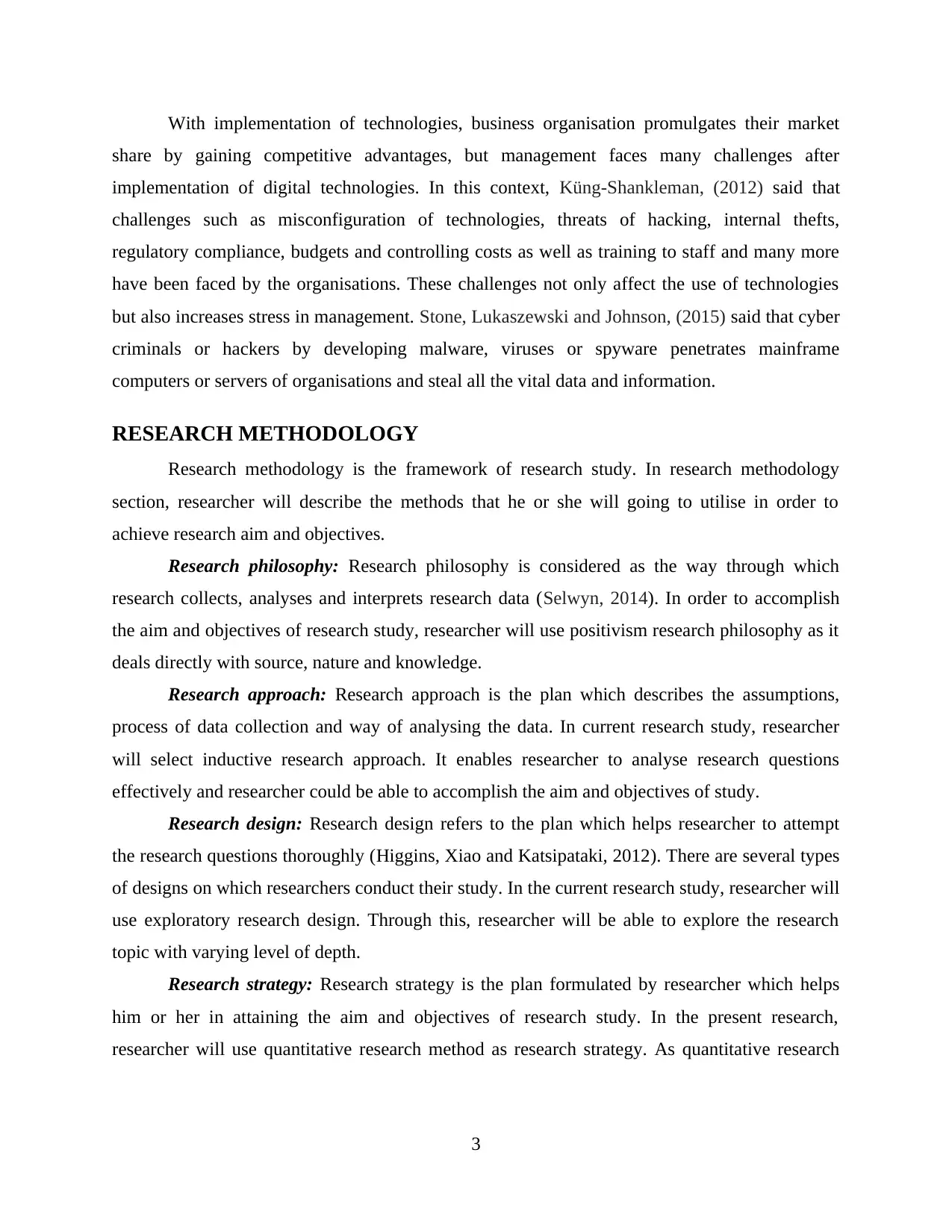
With implementation of technologies, business organisation promulgates their market
share by gaining competitive advantages, but management faces many challenges after
implementation of digital technologies. In this context, Küng-Shankleman, (2012) said that
challenges such as misconfiguration of technologies, threats of hacking, internal thefts,
regulatory compliance, budgets and controlling costs as well as training to staff and many more
have been faced by the organisations. These challenges not only affect the use of technologies
but also increases stress in management. Stone, Lukaszewski and Johnson, (2015) said that cyber
criminals or hackers by developing malware, viruses or spyware penetrates mainframe
computers or servers of organisations and steal all the vital data and information.
RESEARCH METHODOLOGY
Research methodology is the framework of research study. In research methodology
section, researcher will describe the methods that he or she will going to utilise in order to
achieve research aim and objectives.
Research philosophy: Research philosophy is considered as the way through which
research collects, analyses and interprets research data (Selwyn, 2014). In order to accomplish
the aim and objectives of research study, researcher will use positivism research philosophy as it
deals directly with source, nature and knowledge.
Research approach: Research approach is the plan which describes the assumptions,
process of data collection and way of analysing the data. In current research study, researcher
will select inductive research approach. It enables researcher to analyse research questions
effectively and researcher could be able to accomplish the aim and objectives of study.
Research design: Research design refers to the plan which helps researcher to attempt
the research questions thoroughly (Higgins, Xiao and Katsipataki, 2012). There are several types
of designs on which researchers conduct their study. In the current research study, researcher will
use exploratory research design. Through this, researcher will be able to explore the research
topic with varying level of depth.
Research strategy: Research strategy is the plan formulated by researcher which helps
him or her in attaining the aim and objectives of research study. In the present research,
researcher will use quantitative research method as research strategy. As quantitative research
3
share by gaining competitive advantages, but management faces many challenges after
implementation of digital technologies. In this context, Küng-Shankleman, (2012) said that
challenges such as misconfiguration of technologies, threats of hacking, internal thefts,
regulatory compliance, budgets and controlling costs as well as training to staff and many more
have been faced by the organisations. These challenges not only affect the use of technologies
but also increases stress in management. Stone, Lukaszewski and Johnson, (2015) said that cyber
criminals or hackers by developing malware, viruses or spyware penetrates mainframe
computers or servers of organisations and steal all the vital data and information.
RESEARCH METHODOLOGY
Research methodology is the framework of research study. In research methodology
section, researcher will describe the methods that he or she will going to utilise in order to
achieve research aim and objectives.
Research philosophy: Research philosophy is considered as the way through which
research collects, analyses and interprets research data (Selwyn, 2014). In order to accomplish
the aim and objectives of research study, researcher will use positivism research philosophy as it
deals directly with source, nature and knowledge.
Research approach: Research approach is the plan which describes the assumptions,
process of data collection and way of analysing the data. In current research study, researcher
will select inductive research approach. It enables researcher to analyse research questions
effectively and researcher could be able to accomplish the aim and objectives of study.
Research design: Research design refers to the plan which helps researcher to attempt
the research questions thoroughly (Higgins, Xiao and Katsipataki, 2012). There are several types
of designs on which researchers conduct their study. In the current research study, researcher will
use exploratory research design. Through this, researcher will be able to explore the research
topic with varying level of depth.
Research strategy: Research strategy is the plan formulated by researcher which helps
him or her in attaining the aim and objectives of research study. In the present research,
researcher will use quantitative research method as research strategy. As quantitative research
3
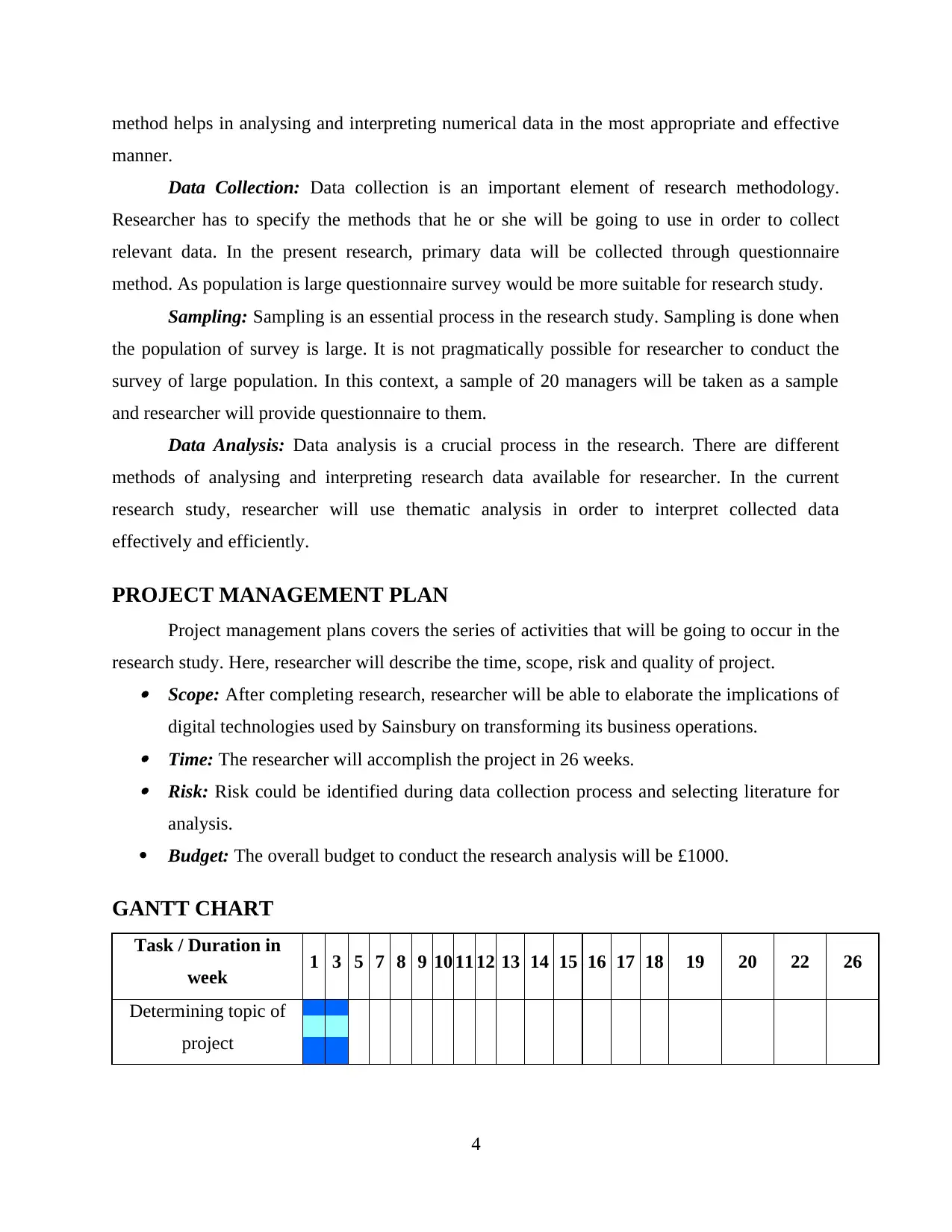
method helps in analysing and interpreting numerical data in the most appropriate and effective
manner.
Data Collection: Data collection is an important element of research methodology.
Researcher has to specify the methods that he or she will be going to use in order to collect
relevant data. In the present research, primary data will be collected through questionnaire
method. As population is large questionnaire survey would be more suitable for research study.
Sampling: Sampling is an essential process in the research study. Sampling is done when
the population of survey is large. It is not pragmatically possible for researcher to conduct the
survey of large population. In this context, a sample of 20 managers will be taken as a sample
and researcher will provide questionnaire to them.
Data Analysis: Data analysis is a crucial process in the research. There are different
methods of analysing and interpreting research data available for researcher. In the current
research study, researcher will use thematic analysis in order to interpret collected data
effectively and efficiently.
PROJECT MANAGEMENT PLAN
Project management plans covers the series of activities that will be going to occur in the
research study. Here, researcher will describe the time, scope, risk and quality of project. Scope: After completing research, researcher will be able to elaborate the implications of
digital technologies used by Sainsbury on transforming its business operations. Time: The researcher will accomplish the project in 26 weeks. Risk: Risk could be identified during data collection process and selecting literature for
analysis.
Budget: The overall budget to conduct the research analysis will be £1000.
GANTT CHART
Task / Duration in
week 1 3 5 7 8 9 10 11 12 13 14 15 16 17 18 19 20 22 26
Determining topic of
project
4
manner.
Data Collection: Data collection is an important element of research methodology.
Researcher has to specify the methods that he or she will be going to use in order to collect
relevant data. In the present research, primary data will be collected through questionnaire
method. As population is large questionnaire survey would be more suitable for research study.
Sampling: Sampling is an essential process in the research study. Sampling is done when
the population of survey is large. It is not pragmatically possible for researcher to conduct the
survey of large population. In this context, a sample of 20 managers will be taken as a sample
and researcher will provide questionnaire to them.
Data Analysis: Data analysis is a crucial process in the research. There are different
methods of analysing and interpreting research data available for researcher. In the current
research study, researcher will use thematic analysis in order to interpret collected data
effectively and efficiently.
PROJECT MANAGEMENT PLAN
Project management plans covers the series of activities that will be going to occur in the
research study. Here, researcher will describe the time, scope, risk and quality of project. Scope: After completing research, researcher will be able to elaborate the implications of
digital technologies used by Sainsbury on transforming its business operations. Time: The researcher will accomplish the project in 26 weeks. Risk: Risk could be identified during data collection process and selecting literature for
analysis.
Budget: The overall budget to conduct the research analysis will be £1000.
GANTT CHART
Task / Duration in
week 1 3 5 7 8 9 10 11 12 13 14 15 16 17 18 19 20 22 26
Determining topic of
project
4
⊘ This is a preview!⊘
Do you want full access?
Subscribe today to unlock all pages.

Trusted by 1+ million students worldwide
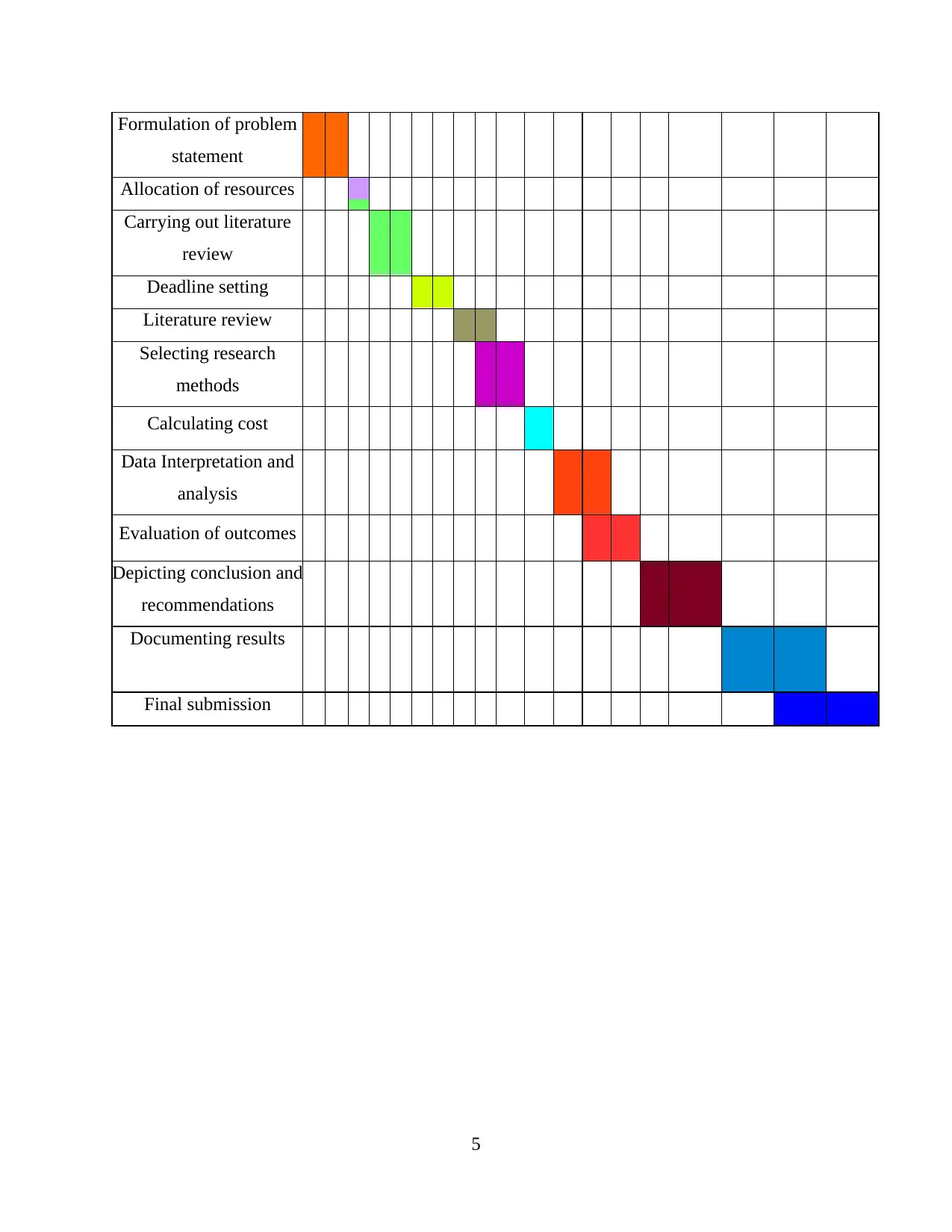
Formulation of problem
statement
Allocation of resources
Carrying out literature
review
Deadline setting
Literature review
Selecting research
methods
Calculating cost
Data Interpretation and
analysis
Evaluation of outcomes
Depicting conclusion and
recommendations
Documenting results
Final submission
5
statement
Allocation of resources
Carrying out literature
review
Deadline setting
Literature review
Selecting research
methods
Calculating cost
Data Interpretation and
analysis
Evaluation of outcomes
Depicting conclusion and
recommendations
Documenting results
Final submission
5
Paraphrase This Document
Need a fresh take? Get an instant paraphrase of this document with our AI Paraphraser
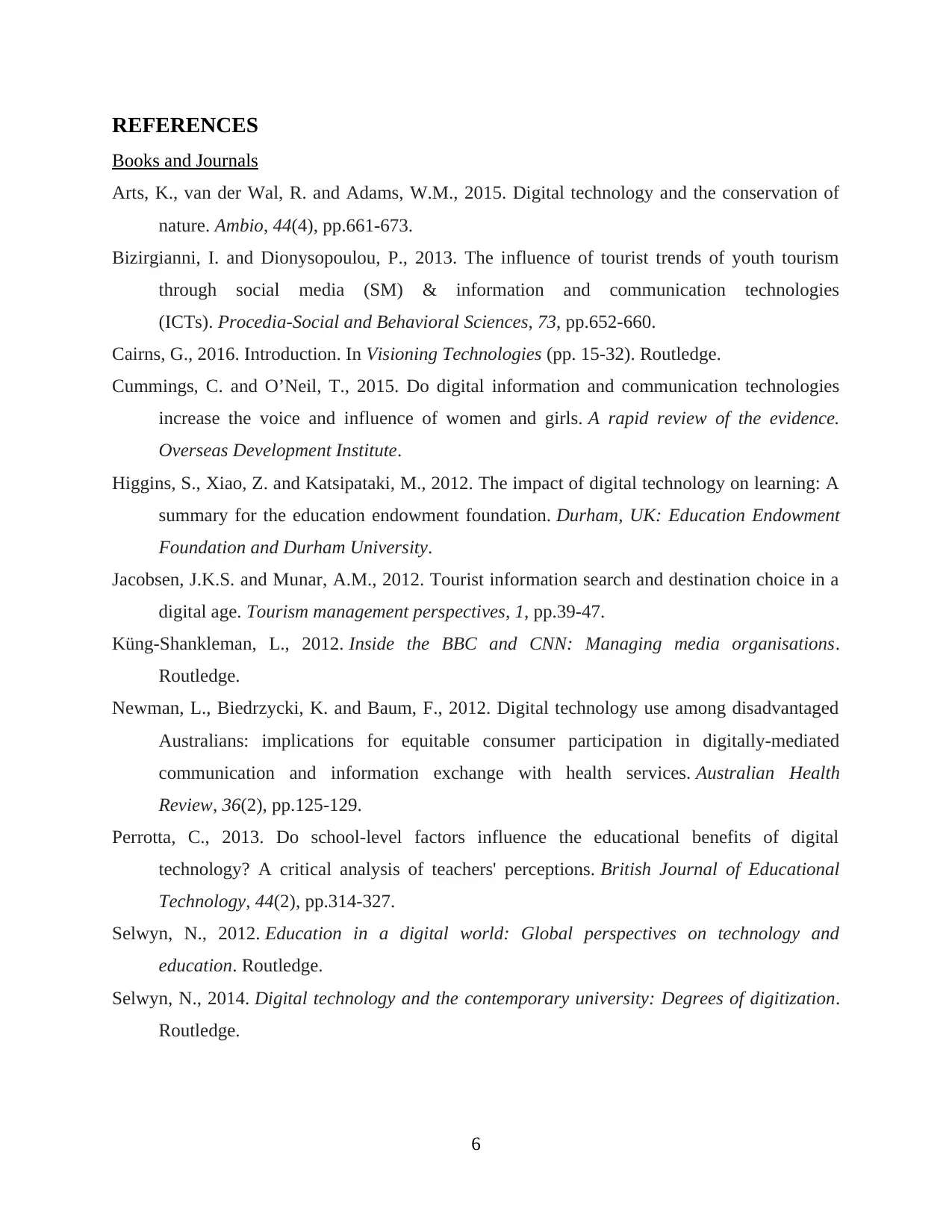
REFERENCES
Books and Journals
Arts, K., van der Wal, R. and Adams, W.M., 2015. Digital technology and the conservation of
nature. Ambio, 44(4), pp.661-673.
Bizirgianni, I. and Dionysopoulou, P., 2013. The influence of tourist trends of youth tourism
through social media (SM) & information and communication technologies
(ICTs). Procedia-Social and Behavioral Sciences, 73, pp.652-660.
Cairns, G., 2016. Introduction. In Visioning Technologies (pp. 15-32). Routledge.
Cummings, C. and O’Neil, T., 2015. Do digital information and communication technologies
increase the voice and influence of women and girls. A rapid review of the evidence.
Overseas Development Institute.
Higgins, S., Xiao, Z. and Katsipataki, M., 2012. The impact of digital technology on learning: A
summary for the education endowment foundation. Durham, UK: Education Endowment
Foundation and Durham University.
Jacobsen, J.K.S. and Munar, A.M., 2012. Tourist information search and destination choice in a
digital age. Tourism management perspectives, 1, pp.39-47.
Küng-Shankleman, L., 2012. Inside the BBC and CNN: Managing media organisations.
Routledge.
Newman, L., Biedrzycki, K. and Baum, F., 2012. Digital technology use among disadvantaged
Australians: implications for equitable consumer participation in digitally-mediated
communication and information exchange with health services. Australian Health
Review, 36(2), pp.125-129.
Perrotta, C., 2013. Do school‐level factors influence the educational benefits of digital
technology? A critical analysis of teachers' perceptions. British Journal of Educational
Technology, 44(2), pp.314-327.
Selwyn, N., 2012. Education in a digital world: Global perspectives on technology and
education. Routledge.
Selwyn, N., 2014. Digital technology and the contemporary university: Degrees of digitization.
Routledge.
6
Books and Journals
Arts, K., van der Wal, R. and Adams, W.M., 2015. Digital technology and the conservation of
nature. Ambio, 44(4), pp.661-673.
Bizirgianni, I. and Dionysopoulou, P., 2013. The influence of tourist trends of youth tourism
through social media (SM) & information and communication technologies
(ICTs). Procedia-Social and Behavioral Sciences, 73, pp.652-660.
Cairns, G., 2016. Introduction. In Visioning Technologies (pp. 15-32). Routledge.
Cummings, C. and O’Neil, T., 2015. Do digital information and communication technologies
increase the voice and influence of women and girls. A rapid review of the evidence.
Overseas Development Institute.
Higgins, S., Xiao, Z. and Katsipataki, M., 2012. The impact of digital technology on learning: A
summary for the education endowment foundation. Durham, UK: Education Endowment
Foundation and Durham University.
Jacobsen, J.K.S. and Munar, A.M., 2012. Tourist information search and destination choice in a
digital age. Tourism management perspectives, 1, pp.39-47.
Küng-Shankleman, L., 2012. Inside the BBC and CNN: Managing media organisations.
Routledge.
Newman, L., Biedrzycki, K. and Baum, F., 2012. Digital technology use among disadvantaged
Australians: implications for equitable consumer participation in digitally-mediated
communication and information exchange with health services. Australian Health
Review, 36(2), pp.125-129.
Perrotta, C., 2013. Do school‐level factors influence the educational benefits of digital
technology? A critical analysis of teachers' perceptions. British Journal of Educational
Technology, 44(2), pp.314-327.
Selwyn, N., 2012. Education in a digital world: Global perspectives on technology and
education. Routledge.
Selwyn, N., 2014. Digital technology and the contemporary university: Degrees of digitization.
Routledge.
6
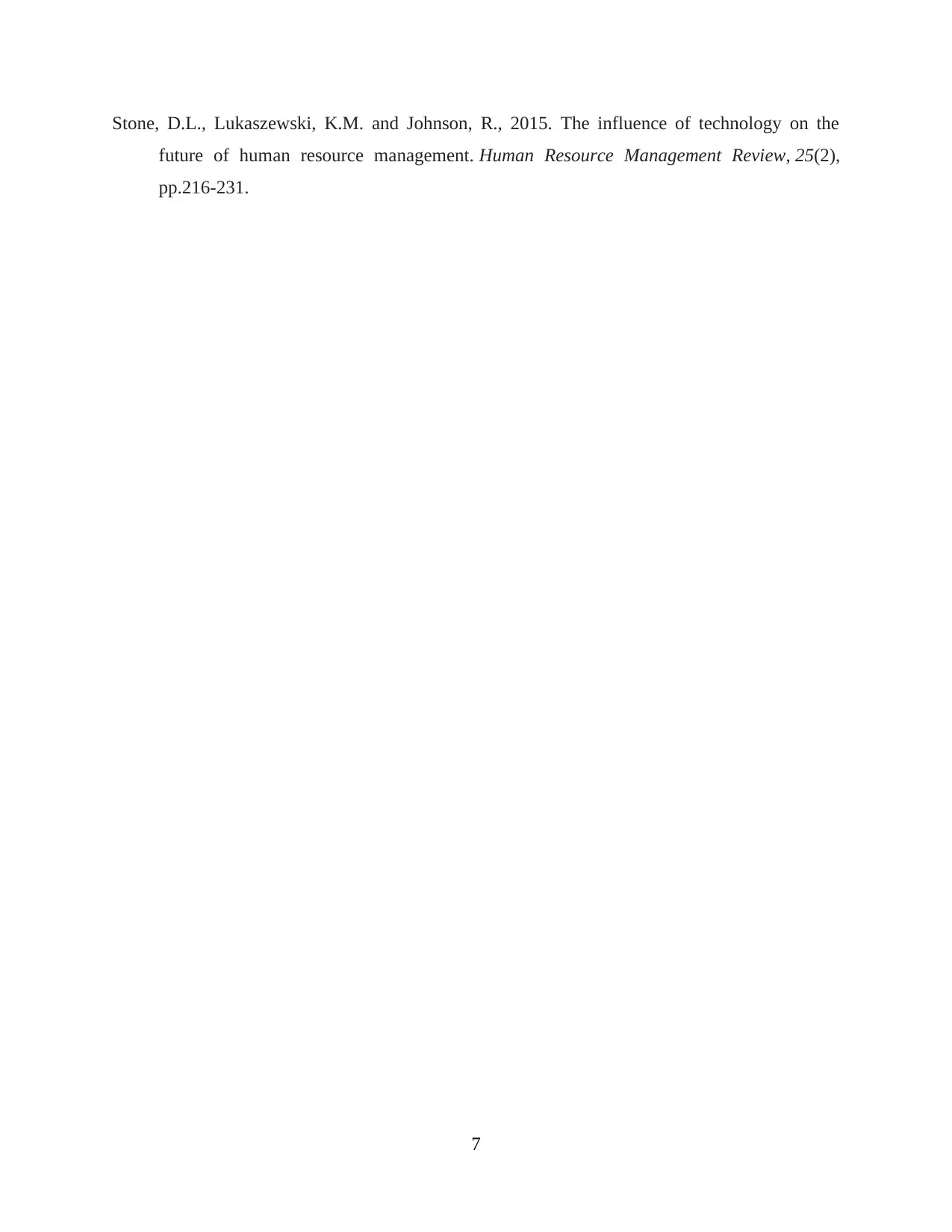
Stone, D.L., Lukaszewski, K.M. and Johnson, R., 2015. The influence of technology on the
future of human resource management. Human Resource Management Review, 25(2),
pp.216-231.
7
future of human resource management. Human Resource Management Review, 25(2),
pp.216-231.
7
⊘ This is a preview!⊘
Do you want full access?
Subscribe today to unlock all pages.

Trusted by 1+ million students worldwide
1 out of 9
Related Documents
Your All-in-One AI-Powered Toolkit for Academic Success.
+13062052269
info@desklib.com
Available 24*7 on WhatsApp / Email
![[object Object]](/_next/static/media/star-bottom.7253800d.svg)
Unlock your academic potential
Copyright © 2020–2025 A2Z Services. All Rights Reserved. Developed and managed by ZUCOL.




